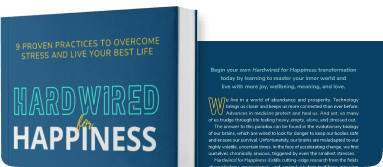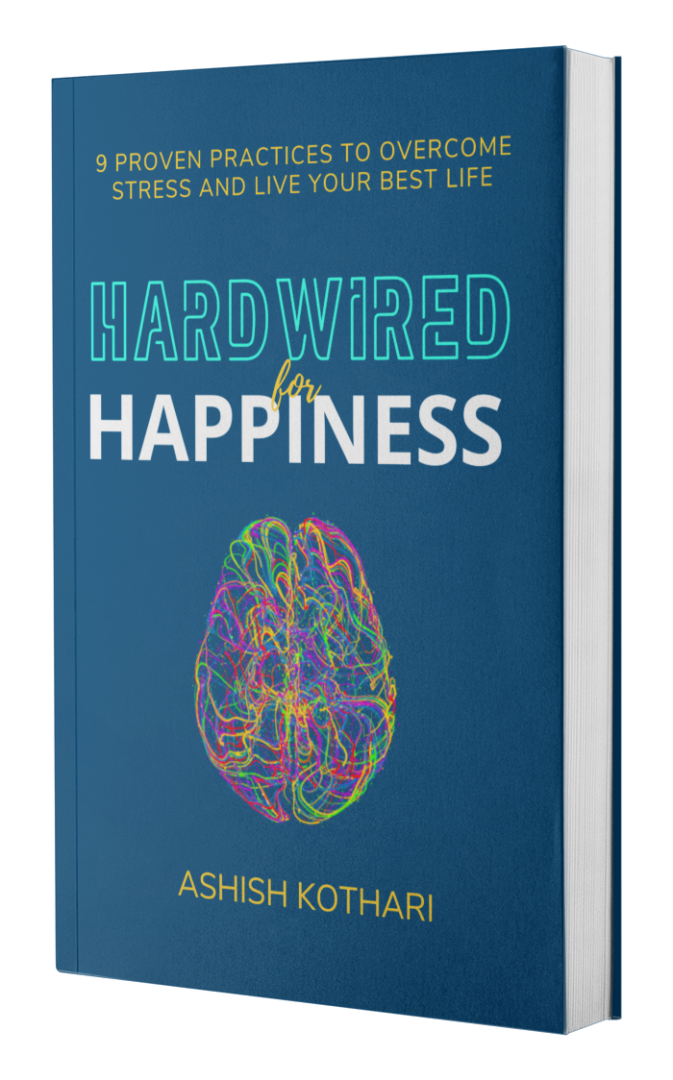Building Happy Habits for Long-term Joy with Ashish Kothari

We often think of happiness as a stroke of luck. But happiness is actually a state of being, building happy habits and a skill we can develop through consistent practice. It’s about cultivating ‘happy habits’ in our professional and personal lives, habits that foster a sense of well-being and long-term joy from within. And, we have just the right guide for you!
In this article, Happiness Squad Founder, Ashish Kothari, teaches us the 9 Hardwired For Happiness Practices and how we can infuse more happiness into our daily routine.
“We cannot avoid suffering or hardships in life, but what we can do, is cultivate that inner state of calm, joy, and peace that allows us a higher ability to navigate whatever the world throws at us.”
– Ashish Kothari
Happiness as a State of Being
Let’s face it, finding happiness can seem tough. Many of us think happiness comes from situations – like getting a new job or buying something we want. These things might give us a temporary thrill, but these things don’t always make us as happy for a long period. If we keep looking at happiness this way, we end up chasing after it and it will always seem out of reach.

Moreover, it can be tougher searching for happiness today. With all the difficulties happening in the world – from big global crises to our own personal struggles – it might feel like being happy is out of our control. But according to Ashish, happiness is a state of being. True happiness is unwavering, no matter what happens in the world.
He shares a really important message: happiness is something we can actually grow in our lives, like nurturing a garden. This is where the ‘9 Hardwired For Happiness’ Practices come in, and we’ll explore that through the Sunflower Model.
The Sunflower Model
Sunflowers always face the sun. It chooses to follow and change direction as the sun moves across the sky. That is what the Sunflower Model symbolizes: happiness is a choice and a direction we can consciously turn towards. Using this framework, we can change how we view the world and ourselves, and meet the world from that state of happiness so that we can navigate it better. It contains practices that combine positive psychology and neuroscience that teach us to look inward and find joy within, not just from the outside. These happy habits help us understand our beliefs about happiness and how to align our actions with our inner values.

“We can always choose happiness, and meet the world from that state of happiness so that we can navigate it better.”
– Ashish Kothari
Self-awareness
Self-awareness goes beyond just knowing yourself deeply. Ashish points out that a deeper level of awareness is consciousness. Who’s really making sense of things? Where’s your ego playing a part? How do emotions and even your body language affect your decisions? This isn’t just surface-level stuff. Having self-awareness means digging into your core beliefs to really understand what’s holding you back.

Think of it like dealing with addiction. It’s easy to say, “Just quit drinking or using drugs.” But the real question is, why are you reaching for these in the first place? What are you trying to hide from or numb? Cultivating self-awareness is the same. You’ve got to face these deeper issues head-on to truly overcome challenges and flourish.
Purpose

Purpose is another happy habit that the Sunflower Model highlights. It’s all about finding meaning in what we do and doing something for a powerful reason. Often, we find ourselves stuck in unsatisfying and directionless situations, like a job we don’t enjoy, because we lack a clear ‘why’. According to Ashish, cultivating our purpose means finding something meaningful to run towards, and having self-awareness. Your purpose is your North Star in life, guiding you to really make a difference.
Mindful Living
Mindful living is about being present in the moment. Our brains are incredible, with the power to remember the past and imagine countless futures. But often, we lose control of this gift. We get stuck rehashing past regrets or fretting about what’s to come, thanks to our brain’s built-in negativity bias, designed to keep us safe. This constant battle between past resentments and future anxieties can lead to a state of constant stress, triggering our fight-flight-freeze response.

That’s where mindfulness comes in. It’s a key happy habit that helps us break free from this cycle, helping us to manage the rush of anxieties in our bodies. By practicing mindfulness, we can regain control of our thoughts and emotions and enhance our ability to navigate life’s challenges with clarity and calm.
Gratitude
Gratitude shifts our focus from what we lack to what we have. It’s a powerful tool that helps us see the abundance in life, even during tough times. Having gratitude may not fix a problem, but it does bring lightness and opens our eyes to see what we have. It’s a happy habit that pushes us to recognize and appreciate our blessings, big and small, which can profoundly change our outlook, helping us to find joy and contentment in our current circumstances.

Mastering Emotions
Mastering our emotions is a crucial part of the Sunflower Model that hits home to Ashish. Managing our reactions is a challenge many of us face, but once we learn to master it, it can be a game-changer that will transform our relationships with one another.
“No matter what you’re navigating, even if you’ve messed up or faced public shaming, remember, we all make mistakes, but we can always grow from them.”
– Ashish Kothari
Compassion
Another big part of the Sunflower Model is the happy habit of compassion, both for ourselves and others. We all need to learn to not be too hard on ourselves, especially when we make mistakes. It’s about giving ourselves a safe space while still growing from our experiences.
Wellbeing
Well-being is crucial for a happier life, especially as we’re living longer. Kids today might live into their 90s, but without practicing well-being habits for our body, mind, and spirit, those years could be tough and worse, even shortened. We don’t want to just survive; we want to thrive.
Community
Ashish highlights that community is a major driver of flourishing and success. Remember, it’s never too late to build a supportive network. We don’t have to do our journey of cultivating happiness alone. Practicing “happy habits” that involve others fosters connections that uplift and empower us to do more and be more.
Living Intentionally
We often start our days in a rush, end them exhausted, binge-watching TV or unwinding with a drink, only to repeat it all over again. Days turn into weeks, weeks into months, and before we know it, years have passed, leaving us wondering where life went. But remember, no matter how busy you are, you can transform your life with intentional living.
Conclusion
Many of us struggle with finding fulfillment in our careers, maintaining healthy relationships, building good habits, and managing stress. We often find ourselves stuck in routines that don’t align with our true selves, but this only leads us to dissatisfaction and burnout. However, these 9 Hardwired For Happiness Practices offer us a way out of this vicious cycle.

Ashish shows us that our brains can actually learn to be happier by shifting our mindsets positively. By cultivating these ‘happy habits,’ we can face life’s challenges head-on with a sense of calm, peace, and happiness, regardless of external circumstances.
Ashish introduces us to the Sunflower Model of the 9 Hardwired for Happiness practices, which includes self-awareness, purpose, mindfulness, gratitude, mastering emotions, well-being, building a sense of community, and intentional living. These happy habits offer us tangible tools to navigate through our daily challenges and plant the seeds of a happier, more fulfilling life.
Learn more about Ashish at his LinkedIn.
Listen to the podcast with Ashish below.
Access and subscribe to all of the episodes of the Flourishing Edge Podcast here.
Visit the REWIRE Program powered up by the HAPPINESS SQUAD Community and experience your shift within your 30-day risk-free trial today. Cultivate your Self-Awareness, Gratitude, Purpose, Community, and personal growth more through the 9 Hardwired for Happiness practices. Integrate simple and proven micro-practices grounded in the science of happiness and neuroscience of habit formation in 5 minutes a day.
Make Flourishing Your Competitive Edge.


